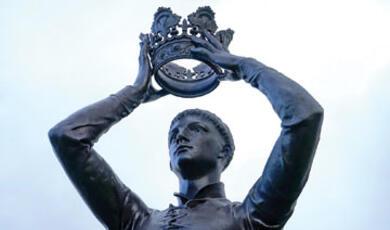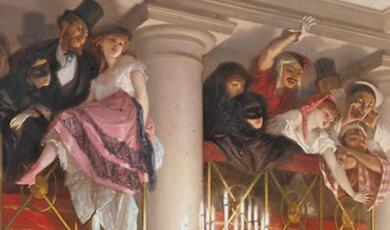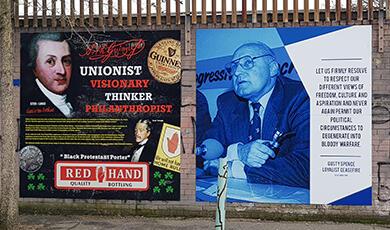Villains in the Novel: from Dickens, Hardy and Wilkie Collins to Hilary Mantel
Share
- Details
- Text
- Audio
- Downloads
- Extra Reading
Are villains cardboard characters? If so, why do we enjoy them so much?
Drawing examples from film and TV drama, as well as from popular fiction, this lecture will try to explain the satisfaction of villainy for the audience. Using the novels of Wilkie Collins and Thomas Hardy, it will look at the development of the villain in nineteenth-century fiction; and at examples of contemporary literary novelists, like Hilary Mantel, who are willing to unleash the energies of villainy.
Download Text
Villains in the Novel:
from Dickens, Hardy and Wilkie Collins to Hilary Mantel
Professor John Mullan
First, a cameo of standard villainy from its chief representative for those of us who watched imported TV drama in the 1980s.
[clip from Dallas]
‘Let me explain it to you so that even you can understand.’
The classic villain’s line: sarcastically polite, infinitely condescending, smirkingly sadistic.
But also note the crucial signs of the fulfilment of the villain role: ‘You knew’ says the foolish Peter; ‘Yes’, replied JR.
‘You planned this whole thing,’ says the not-particularly-surprised wife; ‘Of course I did,’ says JR.
Of course. For, as we shall see, the crucial power of the villain is to be in charge of the plot.
This is from an episode of Season 7, in 1983. A vintage year.
From April 1978 to Hay 1991, the scriptwriters – and the actor Larry Hagman - had to maintain our interest for 13 years over 357 episodes. (Hagman was the only actor who appeared in all 357.) Villainy was really the best way of doing it.
Have we outlived villains? Not in popular culture, evidently. Over and over again, at least in the British press, the President of Russia has been likened to a particular literary character.
In the ghastliness of the present war, the only bearable jokes have been at President Putin’s expense (we know that tyrants hate to be laughed at) and have mostly been about his performance as a certain kind of villain
“There’s Zelenskiy,” says Patrikarakos, “and then there’s this Botoxed Bond villain who won’t sit at a table with other people. All that’s missing is a trapdoor and a pool of sharks.”
Guardian, 25 March 2022
A body language expert has revealed that Russian President Vladimir Putin oozes “understated menace” you would see from watching a villain in a James Bond movie
Daily Star, 25 February 2022
One might wonder why Vladimir Putin has not yet appropriated an extinct volcano for himself as his lair. After all, Monday’s meeting of his Security Council, after all, saw him in full Blofeld mode, lacking only a white cat and a pool of piranhas to channel his inner Bond villain.
Daily Telegraph, 23 February 2022
Popular fiction has, indirectly, given us that frequently used compound noun that the Oxford English Dictionary, inexplicabvly, has not yet got round to recording: ‘Bond villain’. I think that this derives from the films rather than the Ian Fleming novels, not least because the performance of the villain role is usually the high-camp highlight of each new James Bond film.
The pools of sharks and piranhas come from films: the shark tank from the 1977 film The Spy Who Loved Me, in which the villain, Karl Stromberg (Curt Jürgens) presses the switch that sends his glamorous assistant down into the shark tank; the piranhas from the 1967 film You Only Live Twice, in which Blofeld (Donald Pleasence) admonishes SPECTRE agent Helga Brandt for failing to assassinate Bond, before activating the mechanism that drops her into a pool of piranhas.
Pour encourager les autres
But it does have its origin in prose fiction.
It is in Ian Fleming’s Thunderball that we first meet Ernst Blofeld. We are introduced to him presiding at the SPECTRE high table like the Master of a Satanic Oxbridge College.
Ernst Blofeld…. gazed slowly round the faces of his twenty men, and looked for eyes that didn’t squarely meet his. Blofeld’s own eyes were deep black pools surrounded – totally surrounded, as Mussolini’s were – by very clear whites … they stripped the guilty or the false and made him feel transparent – as transparent as a fishbowl through whose sides Blofeld examined, with only the most casual curiosity, the few solid fish, the grains of truth, suspended in the void of deceit or attempted obscurity.
Ian Fleming, Thunderball (1961) Ch. 5
He controls through the gaze only.
Fleming’s villains are frequently ‘foreign’. Fleming imitates John Buchan’s Richard Hannay novels, whose arch-villains are the Germans von Stumm and von Schwabing and the Spanish-Irish Dominick Medina. Fleming lines up the ‘half Chinese and half German’ Dr. No, Ernst Stavro Blofeld ‘born in Gdynia of a Polish father and a Greek mother’ and Auric Goldfinger, at whose provenance Bond can only guess. ‘Not a Slav. Perhaps a German – no, a Balt!’
Villain is an old word, dating back to the thirteenth century, but usually meaning just a bad person – a scoundrel. According to the Oxford English Dictionary, it takes on a sharper new meaning in the early nineteenth century.
(Usually with the.) The character in a play, novel, etc., whose evil motives or actions form an important element in the plot. Also transferred, esp. in villain of the piece.
1822 C. Lamb in London Mag. Feb. 178/2 The fact is, you do not believe in such characters as Surface—the villain of artificial comedy—even while you read or see them.
Two important things here. Firstly, there is something unbelievable about this kind of character. Secondly, that he might be found on the stage.
Where do villains come from?
One answer is, the stage. Here is Barabas, boasting to his servant Ithimore, in Christopher Marlowe’s The Jew of Malta.
As for my selfe, I walke abroad a nights
And kill sicke people groaning under walls:
Sometimes I goe about and poyson wells;
And now and then, to cherish Christian theeves,
I am content to lose some of my Crownes;
That I may, walking in my Gallery,
See ’em goe pinion’d along by my dove.
Being young I studied Physicke, and began
To practice first upon the Italian;
There I enrich’d the Priests with burials,
And alwayes kept the Sexton's armes in ure
With digging graves and ringing dead mens keels:
And after that I was an Engineere,
And in the warres ’twixt France and Germanie,
Under presence of helping Charles the fifth,
Slew friend and enemy with my stratagems
Marlowe, The Jew of Malta (1590), Act 2, Sc. 3.
This itself owes something to the tradition of the figure of the ‘Vice’ in the so-called Tudor interludes of the first half of the sixteenth century. This character would often address the audience with cynical boastfulness.
On the stage, villains often get soliloquies.
And therefore, since I cannot prove a lover,
To entertain these fair well-spoken days,
I am determined to prove a villain
And hate the idle pleasures of these days.
Plots have I laid, inductions dangerous,
By drunken prophecies, libels and dreams,
To set my brother Clarence and the king
In deadly hate the one against the other:
Richard III (1592?) Act 1, Sc. 1
Villains know the plot, because villains make the plot. And we are made knowing or complicit. So, however we may officially disapprove, we are being offered an ignoble kind of entertainment. Even when the villain is as poisonous as this one.
Cassio’s a proper man: let me see now:
To get his place and to plume up my will
In double knavery--How, how? Let’s see:--
After some time, to abuse Othello’s ear
That he is too familiar with his wife.
He hath a person and a smooth dispose
To be suspected, framed to make women false.
The Moor is of a free and open nature,
That thinks men honest that but seem to be so,
And will as tenderly be led by the nose
As asses are.
I have’t. It is engender’d. Hell and night
Must bring this monstrous birth to the world's light.
Shakespeare, Othello (1603), Act 1, Sc. 3
We are allowed to be present at the very hatching of the plot, to which all the other characters in the play will be helplessly bound.
As Iago shows us, villains are cynics and misanthropes – so (knowing that the villain must be defeated in the end), we – spectators or readers – are permitted to think for a while in a cynical or misanthropic way.
We know what the villain is up to and can even enjoy his fraudulent performance. Writing initially for children (in the weekly magazine Young Folks), Robert Louis Stevenson had some lessons about the charms of the accomplished villain.
Our narrator, the teenage Jim Hawkins, has been warned by the now-dead pirate captain Billy Bones about ‘a sea-faring man with one leg’, but when he meets such a man, running the Spy-Glass in in Bristol, and is told that this man, Long John Silver, will be the cook on a voyage to find the Treasure Island, he chooses to put aside all warnings.
“He was very tall and strong, with a face as big as a ham—plain and pale, but intelligent and smiling. Indeed, he seemed in the most cheerful spirits, whistling as he moved about among the tables, with a merry word or a slap on the shoulder for the more favoured of his guests.
“Now, to tell you the truth, from the very first mention of Long John in Squire Trelawney’s letter I had taken a fear in my mind that he might prove to be the very one-legged sailor whom I had watched for so long at the old Benbow. But one look at the man before me was enough. I had seen the captain, and Black Dog, and the blind man, Pew, and I thought I knew what a buccaneer was like—a very different creature, according to me, from this clean and pleasant-tempered landlord.”
Robert Louis Stevenson, Treasure Island (1881-20), Ch. VIII
But then, in the chapter called ‘What I Heard in the Apple Barrel’, Jim hears what a villain truly is. They are halfway across the Atlantic; Jim has crept inside the apple barrel to get apples and dozed off. Then he wakes to overhear LJS talking with the crew he has helped to hire. Onew of them asks him what they will do with the ship’s captain, with Jim’s friends the Dr Livesey and Squire Trelawney, and with Jim himself.
“Right you are,” said Silver; “rough and ready. But mark you here, I’m an easy man—I’m quite the gentleman, says you; but this time it’s serious. Dooty is dooty, mates. I give my vote—death. When I’m in Parlyment and riding in my coach, I don’t want none of these sea-lawyers in the cabin a-coming home, unlooked for, like the devil at prayers. Wait is what I say; but when the time comes, why, let her rip!”
“John,” cries the coxswain, “you’re a man!”
“You’ll say so, Israel when you see,” said Silver. “Only one thing I claim—I claim Trelawney. I’ll wring his calf’s head off his body with these hands, Dick!”
Robert Louis Stevenson, Treasure Island (1881-20), Ch. XI
Murders are part of the plan. LJS is the chief planner.
Villains have had a rich like in English fiction.
In the eighteenth century, one novel gave the character of a villain a whole new life.
The novel is Samuel Richardson’s Clarissa and the villain is Robert Lovelace.
He plots and plans, schemes and deceives, in order to win over – to seduce, as he hopes – the beautiful and thrillingly virtuous Clarissa Harlowe.
[see Francis Hayman painting]
In lengthy, gloriously self-expressive letters, he confides in his fellow rake, Jack Belford. He does not just reveal himself and his villainous schemes – he glories in his libertinism and in the ingenuity of his plotting.
“Until by matrimonial or equal intimacies I have found her less than angel, it is impossible to think of any other. Then there are so many stimulatives to such a spirit as mine in this affair, besides love: such a field of stratagem and contrivance, which thou knowest to be the delight of my heart. Then the rewarding end of all—to carry off such a girl as this, in spite of all her watchful and implacable friends; and in spite of a prudence and reserve that I never met with in any of the sex. What a triumph!—What a triumph over the whole sex! And then such a revenge to gratify, which is only at present politically reined in, eventually to break forth with the greater fury. Is it possible, thinkest thou, that there can be room for a thought that is not of her, and devoted to her?”
Clarissa, Letter 31
Staying in disguise at an inn near Clarissa’s family home, Harlowe Place (‘sprung up from a dunghill within every elderly person’s remembrance’), Lovelace witnesses the awkward budding romance between the innkeeper’s daughter and a local carpenter – and wishes that he had as good and innocent a heart as either of them.
“I have a confounded mischievous one—by nature too, I think!—A good motion now and then rises from it: but it dies away presently—a love of intrigue!—an invention for mischief!—a triumph in subduing!—fortune encouraging and supporting!—and a constitution—What signifies palliating? But I believe I had been a rogue, had I been a plough-boy.
But the devil's in this sex! Eternal misguiders! Who, that has once trespassed ever recovered his virtue?”
Clarissa, Letter 34
He feels some flicker of goodness, but it is the fault of women (of course!) that ‘it dies away presently’.
Richardson created an intriguing villain, but was first exasperated, and then appalled, at the responses of some of his readers to his creation. The novel appeared in three (long) parts, with gaps of months between them. In the gaps, he was inundated with appeals to marry his villain and his heroine. Lovelace needed reforming, perhaps, but many of his readers – particularly female readers could not help but like, even half-admire, him. Richardson went through his novel, rewriting it to make it more obvious that Lovelace really was bad – and calculating. He even added chiding footnotes.
“Charming creature! thought I, (but I charge thee, that thou let not any of the sex know my exultation,1) Is it so soon come to this?
1 Mr. Lovelace might have spared this caution on this occasion, since many of the sex (we mention it with regret) who on the first publication had read thus far, and even to the lady’s first escape, have been readier to censure her for over-niceness, as we have observed in a former note, (vol I, p. 501), than him for artifices and exultations not less cruel and ungrateful, than ungenerous and unmanly.”
Lovelace’s villain-progeny included the gothic villains of Ann Racliffe – bad, scheming, but (yes!) handsome counts and signors.
Always worry about a Count (Dracula is a Count, after all).
Here is another Count - one of the great villains of Victorian fiction, Wilkie Collins’s Count Fosco.
“What of the Count?
This in two words: He looks like a man who could tame anything. If he had married a tigress, instead of a woman, he would have tamed the tigress. If he had married me, I should have made his cigarettes, as his wife does—I should have held my tongue when he looked at me, as she holds hers.
I am almost afraid to confess it, even to these secret pages. The man has interested me, has attracted me, has forced me to like him. In two short days he has made his way straight into my favourable estimation, and how he has worked the miracle is more than I can tell.”
Wilkie Collins, The Woman in White, The Second Epoch, II
His appearance fascinates the heroic Marion Halcombe, who is narrating this in a kind of journal. She wonders if there is not an aspect of the theatrical about it.
‘His complexion … has a singular sallow-fairness, so much at variance with the dark-brown colour of his hair, that I suspect the hair of being a wig’.
Like Fleming’s Blofeld, he never has to raise his voice because his eyes can exert their power.
“He is a most remarkable likeness, on a large scale, of the great Napoleon. His features have Napoleon’s magnificent regularity—his expression recalls the grandly calm, immovable power of the Great Soldier’s face. This striking resemblance certainly impressed me, to begin with; but there is something in him besides the resemblance, which has impressed me more. I think the influence I am now trying to find is in his eyes. They are the most unfathomable grey eyes I ever saw, and they have at times a cold, clear, beautiful, irresistible glitter in them which forces me to look at him, and yet causes me sensations, when I do look, which I would rather not feel.”
I wonder if any of this sounds familiar? Ian Fleming devotees amongst you might recall that Napoleon is one of the historical figures summoned up as equivalents for Ernst Stavro Blofeld. Some rare men share three qualities: ‘their physical appearance is extraordinary, they have a quality of relaxation, of inner certainty, and they exude a powerful animal magnetism. … Certain great men of history, perhaps Genghis Khan, Alexander the Great, Napoleon, among the politicians, have had these qualities’.
But this is more likely to be familiar to you.
“He is the Napoleon of crime, Watson. He is the organizer of half that is evil and of nearly all that is undetected in this great city. He is a genius, a philosopher, an abstract thinker. He has a brain of the first order. He sits motionless, like a spider in the center of its web, but that web has a thousand radiations, and he knows well every quiver of each of them. He does little himself. He only plans. But his agents are numerous and splendidly organized.”
Arthur Conan Doyle, ‘The Final Problem’, Strand Magazine, December 1893
Perhaps this picture will help?
[Andrew Scott in Sherlock]
Though, for the Victorian reader, it would have been this one.
[illustration from the Strand magazine]
It is, of course, Professor Moriatry.
The very epitome of the modern villain first appears in ‘The Final Problem’, the story that Arthur Conan Doyle wrote in order to end the career – indeed, the life – of Sherlock Holmes.
Holmes arrives at the home of the now married John Watson. He is an uncharacteristically nervous state. Hearing that Mrs. Watson is absent on a visit, he proposes that Watson should come away with him for a week ‘to the Continent’. Why? He responds by asking Watson whether he has ever heard of one ‘Professor Moriarty’. Watson, naturally, has not. Just as Holmes thought! ‘The man pervades London, and no one has heard of him.’
“He is a man of good birth and excellent education, endowed by nature with a phenomenal mathematical faculty. At the age of twenty-one he wrote a treatise upon the Binomial Theorem, which has had a European vogue. On the strength of it he won the Mathematical Chair at one of our smaller universities, and had, to all appearances, a most brilliant career before him. But the man had hereditary tendencies of the most diabolical kind. A criminal strain ran in his blood, which, instead of being modified, was increased and rendered infinitely more dangerous by his extraordinary mental powers.”
Arthur Conan Doyle, ‘The Final Problem’, Strand Magazine, December 1893
Holmes is convinced that Moriarty is the ‘deep organizing power’ behind any number of crimes.
At last, Holmes has met an antagonist who is his ‘intellectual equal’. He tells Watson that he was sitting in his room, pondering his scheme to bring Moriarty to justice, when the door opened and the man himself stood before him. Moriarty tries to persuade him to desist.
Genre fiction still has villains.
Neil Gaiman
Thomas Harris
Ian Rankin’s Inspector Rebus has Big Ger Cafferty.
But literary novelists can make villains too. Here is a controversial recent example, Hilary Mantel’s version of a man whom many call a saint: Sir Thomas More. In a novel narrated rom the point of view of his rival, Thomas Cromwell, he is entirely the villain of the piece.
“… They have to let him go, for lack of evidence, because you can't make anything of a heap of ashes in the hearth.
Monmouth himself would be a heap of ashes, if Thomas More had his way. ‘Not come to see us yet, Master Cromwell?’ he says. ‘Still breaking dry bread in cellars? Come now, my tongue is sharper than you deserve. We must be friends, you know.’
It sounds like a threat. More moves away, shaking his head: ‘We must be friends.’”
Hilary Mantel, Wolf Hall (2009) Part Two, II
The really accomplished historical novelist can be minutely true to the facts, but make anybody the villain.
After the fiction of George Eliot and Henry James, we might wonder if villains are not simply untrue-to-life. Yet why do we enjoy them?
No wonder that Dickens is the great villain-monger of the English novel, for no other great novelist is so committed to plot.
Think of some satisfying examples. Fagin, Ralph Nickleby, Quilp Tulkinghorn, John Jarndyce.
Each generates and tries to control the plot of the novel he is in.
Or how about this?
“Mr Carker was a gentleman thirty-eight or forty years old, of a florid complexion, and with two unbroken rows of glistening teeth, whose regularity and whiteness were quite distressing. It was impossible to escape the observation of them, for he showed them whenever he spoke; and bore so wide a smile upon his countenance (a smile, however, very rarely, indeed, extending beyond his mouth), that there was something in it like the snarl of a cat.”
Dickens, with his instinct for the theatrical, the performative, will often let his villain almost flaunt his villainy. Carker’s very appearance – his very teeth! – mock those who cannot see through his schemes. He is the proud, rich, cold-hearted Mr Dombey’s ‘manager’. He pretends to be his master’s loyal servant – but it is like an act of satire.
“He affected a stiff white cravat, after the example of his principal, and was always closely buttoned up and tightly dressed. His manner towards Mr Dombey was deeply conceived and perfectly expressed. He was familiar with him, in the very extremity of his sense of the distance between them. “Mr Dombey, to a man in your position from a man in mine, there is no show of subservience compatible with the transaction of business between us, that I should think sufficient. I frankly tell you, Sir, I give it up altogether. I feel that I could not satisfy my own mind; and Heaven knows, Mr Dombey, you can afford to dispense with the endeavour.” If he had carried these words about with him printed on a placard, and had constantly offered it to Mr Dombey’s perusal on the breast of his coat, he could not have been more explicit than he was.”
Charles Dickens, Dombey and Son (1846-8), Ch. XIII
It is as much ridicule as manipulation.
Dickens’s love of melodrama allowed him to give us, in Little Dorrit, a villain whose performance of villainousness bordered on comic theatre – even if he was a ruthless murderer and blackmailer.
Rigaud, alias Lagnier, alias Blandois, has the most villainous moustache in fiction. We meet him, first of all the characters in Little Dorrit, in a Marseille prison cell, and watch as his plot weaves all the other characters together – until he turns up at the end, in a dénouement so complex that the Penguin Classics edition has to explain it in an appendix.
Suffice it to say, he has the will that shows that Arther Clennam is not his mother’s biological son – and that Mrs Clennam has disinherited Amy Dorrit of a small fortune. Now Mrs Clennam must pay him to keep it secret. She leaves the house, as he imagines, to get the two thousand pounds he demands
“Whoof! Almost as dull as the infernal old jail. Warmer, but almost as dismal. Wait till she comes back? Yes, certainly; but where is she gone, and how long will she be gone? No matter! Rigaud Lagnier Blandois, my amiable subject, you will get your money. You will enrich yourself. You have lived a gentleman; you will die a gentleman. You triumph, my little boy; but it is your character to triumph. Whoof!
In the hour of his triumph, his moustache went up and his nose came down, as he ogled a great beam over his head with particular satisfaction.”
Charles Dickens, Little Dorrit (1855-7), Book the Second, Ch. XXX
That moustache! Don’t forget it, because we will come to another moustache at the end.
Dickens had a deep appreciation of the role of villain, and sometimes – briefly – let his villain turn against it sometimes the villain turns against his role.
Here is the villain of David Copperfield, Uriah Heep, letting us glimpse why he has pretended to be so ‘umble’, while acting as a predator.
“‘Father and me was both brought up at a foundation school for boys; and mother, she was likewise brought up at a public, sort of charitable, establishment. They taught us all a deal of umbleness—not much else that I know of, from morning to night. We was to be umble to this person, and umble to that; and to pull off our caps here, and to make bows there; and always to know our place, and abase ourselves before our betters. And we had such a lot of betters! Father got the monitor-medal by being umble. So did I. Father got made a sexton by being umble. He had the character, among the gentlefolks, of being such a well-behaved man, that they were determined to bring him in. “Be umble, Uriah,” says father to me, “and you’ll get on. It was what was always being dinned into you and me at school; it’s what goes down best. Be umble,” says father, “and you’ll do!” And really it ain’t done bad!’”
Charles Dickens, David Copperfield Ch. XXXIX
Of course, Heep has had his come-uppance. His glee has gone.
When the fun goes out of being a villain, you might wonder whether it is really the role for you.
I rather hate myself
For hateful deeds committed by myself!
I am a villain: yet I lie. I am not.
Fool, of thyself speak well: fool, do not flatter.
My conscience hath a thousand several tongues,
And every tongue brings in a several tale,
And every tale condemns me for a villain.
Shakespeare, Richard III
An appreciation of the powers of the villain allows some novelists to play with the stereotype – as if a character might act out the stereotype, only to feel manipulated after the event.
Thomas Hardy’s Tess Durbeyfield goes to visit those that she imagines (wrongly) are her rich relations and Alec d’Urberville strolls into the novel as if he were the successor to Richardson’s Lovelace.
“… a figure came forth from the dark triangular door of the tent. It was that of a tall young man, smoking.
He had an almost swarthy complexion, with full lips, badly moulded, though red and smooth, above which was a well-groomed black moustache with curled points, though his age could not be more than three-or four-and-twenty. Despite the touches of barbarism in his contours, there was a singular force in the gentleman's face, and in his bold rolling eye.
“Well, my Beauty, what can I do for you?” said he, coming forward.”
Thomas Hardy, Tess of the d’Urbervilles (1891), V
The moustache! The cigar! At once scheming and opportunistic, he is entirely the villain of the piece.
Yet, having ‘ruined’ Tess, he comes back to her after she has been abandoned by her husband, Angel Clare. He seems to confess, but Hardy has him do something far more complicated.
“The whole blame was mine—the whole unconventional business of our time at Trantridge. You, too, the real blood of which I am but the base imitation, what a blind young thing you were as to possibilities! I say in all earnestness that it is a shame for parents to bring up their girls in such dangerous ignorance of the gins and nets that the wicked may set for them, whether their motive be a good one or the result of simple indifference.”
Tess of the d’Urbervilles , XLVI
‘Unconventional’: ha!
It really was not his fault: it was her parents – it was her. He did not want to be a villain. As he says this, he has become an evangelical religious preacher – but seeing Tess again is destroying his virtue and religious enthusiasm. He learns the plea of the modern villain, which means that you cannot see him as a villain. I am a victim, too.
© Professor John Mullan 2022
Part of:
This event was on Wed, 06 Apr 2022
Support Gresham
Gresham College has offered an outstanding education to the public free of charge for over 400 years. Today, Gresham College plays an important role in fostering a love of learning and a greater understanding of ourselves and the world around us. Your donation will help to widen our reach and to broaden our audience, allowing more people to benefit from a high-quality education from some of the brightest minds.


 Login
Login







